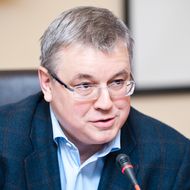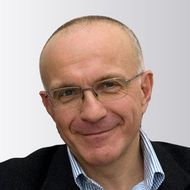University Codes of Conduct Should Be Concise and Precise

The HSE University International Advisory Committee met online on May 19 to discuss the proposed Codes of Conduct for faculty and students, as well as assess the university’s transition to online learning.
As Professor Vadim Radaev, HSE University First Vice Rector, explained, the drafts of the Codes of Conduct were prepared by faculty members and members of the student community, respectively. A Code of Conduct for administrative staff is currently being developed. The Faculty Code of Conduct builds upon the Statement of Values created in 2013. Yet, it is not a set of administrative norms. Since there is no universally accepted standard for such codes, HSE University used a variety of codes of international universities as examples.
The Code of Conduct for faculty members includes provisions regarding academic integrity and commitment; academic freedom; personal integrity and responsibility; honesty and the prevention of misconduct (including academic fraud); mutual respect and collaboration; equality and non-discrimination; and the prevention of violence and sexual harassment. ‘We care about HSE University’s reputation and development, as well as the reputation of its faculty and staff members,’ said Vadim Radaev.

The Student Code of Conduct was presented by one of its authors, Ekaterina Vaseneva, Head of the Student Council of the Faculty of World Economy and International Affairs. While the need for a code of conduct was discussed in 2017, it was only this year that a consolidated document was finally produced by the student community in close cooperation with HSE University faculty members, alumni, and administrators. ‘The Code encapsulates the norms outlined in the HSE University Statement of Values. It also shows what we expect from the university by introducing mutual respect and mutual responsibility. We are ready to set our educational trajectory. We also value transparency in conflict resolution and do not accept any form of academic dishonesty. We wish to maintain an atmosphere of trust and support at the university,’ said Ekaterina Vaseneva.
Commenting on both drafts, Professor Eric Maskin, Chair of the International Advisory Committee, Nobel laureate in Economics, and Adams University Professor at Harvard University, noted that both codes contain a lot of good ideas. However, in his view, the provision that the members of the community have the right of free expression as long as it does not damage the university reputation may not be specific enough and needs to be more precise.
Imagine a member of the faculty who in the course of his research came up with some controversial findings. These findings could get attention in the press and the university might be criticised for allowing this sort of research. I don’t think that this is the type of speech that should be restricted.
Similarly, the provision on not allowing actions and expressions that may be deemed offensive seems too broad and needs to be made more precise. ‘In the course of my research I might come up with findings which suggest that a particular ethnic group is conducting practices that might be harmful to their health. People in that ethnic group might feel offended by my findings,’ Professor Maskin added.
Committee members also made some other suggestions. Philip G. Altbach, the Founding Director of the Center for International Higher Education at Boston College, and Ellen Hazelkorn, Director of the Higher Education Policy Research Unit at the Technological University Dublin, recommended making both codes shorter and more concise. Professor Timothy J. Colton (Harvard University) suggested including a statement that HSE University is part of the global community of scholars and makes its contribution as equals in a wider endeavour.
Some participants supported Professor Maskin’s suggestion about making the wording of some parts of the code more precise. In particular, Professor Daniel Treisman (University of California, Los Angeles) observed that ‘it might make sense to prescribe ‘deliberate action’ rather than things that ‘may be deemed’ offensive’. He also urged to include whistleblower protection provisions in the codes.
HSE University Rector Yaroslav Kuzminov assured committee members that all their comments will be taken into consideration and that the subsequent drafts of the codes will be submitted to the committee.
He also explained where the need for norms regulating statements made by HSE community members stems from. HSE University scholars are independent researchers and they may criticize certain processes happening in Russia and thus enter into conflict with the interests of others.
Yaroslav Kuzminov, HSE University Rector

In order to maintain freedom and professional independence, which will enable the University to continue to exist, we need to stay within a certain framework and be very mindful of how we do this.
In response to Professor Treisman's suggestion of providing a clause guaranteeing protections for whistleblowers in the event of disagreements with university leadership, Yaroslav Kuzminov reminded participants that these protections are stipulated in the administrative regulations. However, whistleblower complaints should be communicated within the university structure. ‘If colleagues begin a struggle for something at the university by sending letters to newspaper editors, and we only find out about it when reading the paper, then we consider this to be conduct that is not made in good conscience, he said. ‘In this case, however, we do not punish colleagues.’ The HSE Rector agreed with the fact that not simply offensive, but ‘deliberately offensive’ actions deserve reprimand; otherwise people can take offense at the behaviour of anyone who says something that contradicts their views.
‘A code of conduct is a code of prescribed behaviour. We are determining what we consider to be appropriate and inappropriate. Violations of these norms will not incur punishment, but rather the judgement of one’s colleagues,’ concluded Yaroslav Kuzminov.
In the second part of the committee meeting, the head of the HSE Institute of Education, Isak Froumin, presented main steps and policies the university has implemented during the pandemic. He noted that HSE University was able to quickly transition to distance learning, postponing only 3% of courses until later semesters. Final exam sessions were also moved online, as well as administrative processes.
HSE University has become the main platform of professional expertise on online teaching and learning for the Russian Ministry of Higher Education and Science. The University actively helps other Russian and CIS universities in their transition to distance learning by providing free access to HSE online courses hosted on different educational platforms. Professor Froumin acknowledged, however, that the introduction of online learning has brought an additional financial burden for the university.
Isak Froumin, Head of the HSE Institute of Education

We were lucky to be able to learn from other universities that had also faced similar challenges slightly earlier. One of the most important things was to encourage students to become digital assistants for their professors – to help them master online teaching instruments.
Professor Froumin also talked about the opportunities for development that the situation has presented. ‘We have seen that we can successfully work with other campuses and universities from other countries. We plan to introduce general courses for all campuses, as well as create new online courses for Russian and international MOOC platforms and develop different conference formats, including those that are fully online, mixed, and so on,’ he explained. In addition, HSE University plans to develop its own proctoring programme.
‘The situation with the pandemic and the reactions to it have been very similar all over the world,’ observed Francisco Marmolejo, Education Advisor at the Qatar Foundation. ‘It is not clear what is going to happen, so it is great to hear that HSE University is considering not just short-term solutions.’
Philip Altbach was pleasantly surprised by the positive reaction of HSE students to online learning, while in the US most students are dissatisfied with emergency online courses. [A recent HSE survey showed that 72% of HSE students are satisfied with how the university moved to distance education. Moreover, 40% prefer distance learning to traditional instruction.] Daneil Treisman recommended analyzing not only the students’ opinions of online learning but also their learning results.
Concluding the meeting, HSE Vice Rector Ivan Prostakov expressed hope that in 2021 the Committee members would be able to gather in Moscow and discuss online education in person.
Philip G. Altbach
Ekaterina Vaseneva
Daniel Treisman
See also:
IAC Welcomes New Members and Discusses HSE University Development
On December 1, key areas of HSE University’s recently adopted strategy were presented at the extended meeting of the International Advisory Committee. Outgoing and new members of IAC learnt more about the University’s initiatives in human capital and AI research, as well as about its plans to build a Master’s Engineering School.
‘The Expertise of Members of IAC Will Be Instrumental in the Continuing Development of the University’
On October 5, HSE University’s International Advisory Committee held an online session. Yaroslav Kuzminov, HSE University Academic Supervisor, introduced the new leadership structure of the University and Rector Nikita Anisimov spoke about his vision for HSE University’s development. Meeting participants discussed various aspects of the University strategy.
International Advisory Committee Meeting Focuses on HSE University’s Third Mission
On May 31, International Advisory Committee met online to discuss HSE University’s third mission, its implementation and place in the university strategy. The meeting focused on HSE University’s volunteering and social initiatives, cooperation with non-profits, community engagement, students’ field research trips around Russia, and HSE Business Incubator.
International Advisory Committee Convenes to Discuss HSE University’s Domestic Partnership Programmes
On February 17, HSE University’s International Advisory Committee met over Zoom to discuss the University’s recent activity and the progress of a number of projects being implemented under HSE University’s University Partnership Programme, which aims to strengthen partnerships and academic collaboration between HSE and other universities in Russia.
International Advisory Committee Recommends a More Focused Approach
Members of the International Advisory Committee (IAC) and the HSE administration have discussed the results of the committee’s annual meeting.
Project 5-100 International Council Confirms HSE’s Leadership
From October 26-27, a regular meeting of the Russian Academic Excellence Project 5-100 was held in Kaliningrad. The academic institutions involved in the project presented the results of their work and plans for the upcoming period of their respective roadmaps.
HSE and Politecnico di Milano to Join Forces in Studying University Performance and Efficiency
A cooperation agreement was recently signed between HSE and Politecnico di Milano (Department of Management, Economics and Industrial Engineering) to jointly embark on a large-scale study entitled Efficiency, Performance and Impact of Higher Education Institutions (EPI). According to the agreement, the IOE Laboratory for University Development will act as the principal R&D venue for this initiative, while Dr. Tommaso Agasisti, Associate Professor at Politecnico di Milano and one of Europe’s most renowned experts in education economics, will take up overall project supervision.
‘We Are Very Excited by How HSE Continues to Develop’
The eighth annual session of the HSE International Advisory Committee has come to a close. Its chairman Eric Maskin, Nobel laureate in economics, summed up the results of the committee’s work.
International Advisory Committee Meets at HSE: 'The University Is Quick to Respond to Recommendations'
Each year, the HSE International Advisory Committee (IAC) meets in Moscow under the leadership of Nobel laureate Eric Maskin. Committee members focus on reorganising the post-graduate school, updating educational and staffing policies, and a number of other important issues.
The University’s Development Is Not an Administrative Process, But a Creative One
HSE Vice Rector Ivan Prostakov discusses the results of a recent International Advisory Committee (IAC) meeting, as well as the priorities the university has set for its international activities.


